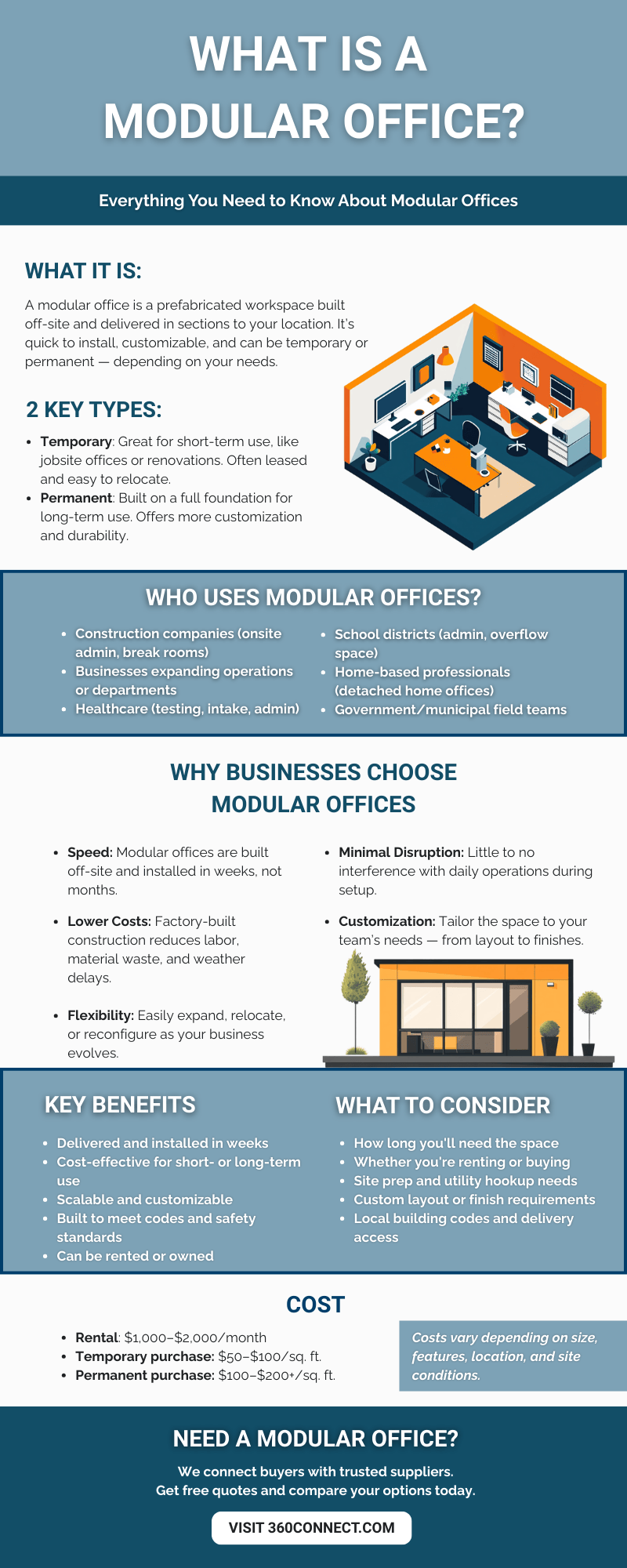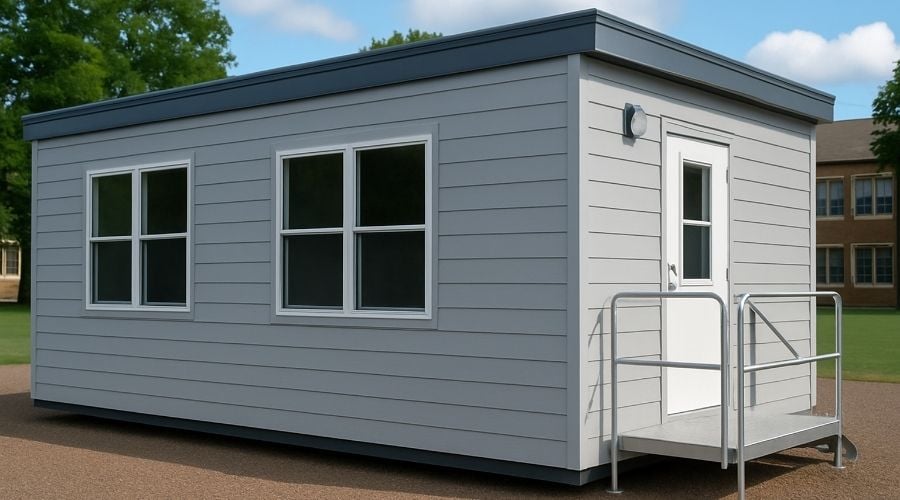If you need more office space — and fast — you’re not alone. Whether your team is growing, your building is under renovation, or you’re expanding to a new location, traditional construction isn’t always the most practical solution. That’s where modular offices come in.
Modular office buildings offer a flexible, affordable way to expand your workspace without the lengthy timelines or hefty costs of site-built construction. But is it the right choice for your business?
In this guide, we’ll walk through what modular offices are, how they work, and the situations where they shine — so you can decide whether they’re the right fit for your company’s needs and goals.
What Is a Modular Office?
A modular office is a prefabricated building — built off-site in a factory and then delivered and assembled on your property. These buildings can be temporary or permanent, and they’re designed to meet the same safety, accessibility, and building codes as traditional office spaces.
Modular offices are often used when businesses need to scale quickly, operate from a remote jobsite, or avoid disruptions from construction on an existing property.

Types of Modular Offices
There’s no one-size-fits-all approach when it comes to modular solutions — and that’s a good thing. Depending on your goals, you can choose between:
Temporary Modular Offices
- Best for short-term use like jobsite offices, field operations, or temporary admin space
- Installed on skids or piers, often leased or rented
- Includes mobile offices, which are built on a trailer base for easy transport
- Delivered quickly and removed just as easily when no longer needed
Note: Mobile offices are a type of temporary modular office designed for portability and fast setup. They’re commonly used on construction sites and other short-term projects.
Permanent Modular Offices
- Built on full foundations
- Designed to last 30+ years
- Fully customizable to match your brand and workflow
- Ideal for long-term expansions or remote facilities
Which one you choose impacts your total cost — and how long you can expect to use the building.
Who Uses Modular Offices — and Why?
Now that you know what modular offices are and the different types available, you might be wondering: Who’s actually using them — and how?
From large-scale job sites to small businesses and remote professionals, modular offices are serving a wide range of industries. Their versatility makes them a go-to solution for companies that need space fast — whether it’s for a few months or the long haul.
Construction & Industrial Companies
Use modular offices as onsite command centers, project management offices, safety stations, or crew break areas. They’re durable, fast to deploy, and can move from one site to the next.
Corporate or Commercial Businesses
Install modular offices to expand their HQ, create temporary departments during renovations, or add conference rooms, training spaces, and even satellite offices.
Healthcare Facilities
Use them for administrative offices, patient intake centers, testing stations, or temporary clinics — especially during expansions or emergencies.
Education & School Campuses
Need modular offices for district admin, faculty space, or temporary program offices while permanent facilities are under construction or reallocated.
Government & Municipal Services
Install modular offices for emergency response coordination, permitting offices, or temporary field operations.
Home-Based Entrepreneurs & Remote Professionals
Even individuals are turning to modular buildings for standalone home offices — especially when space indoors is limited or distractions are high.
Why Businesses Choose Modular Offices
So why are so many industries turning to modular solutions?
The answer comes down to more than just convenience. Businesses choose modular offices because they offer speed, savings, and flexibility — all without sacrificing quality. Whether you’re trying to avoid downtime, reduce costs, or scale up efficiently, modular gives you the tools to stay agile and move fast.
Let’s break down the core reasons why modular is becoming the go-to choice for modern businesses.
Speed: Offices Ready in Weeks, Not Months
Modular offices are built off-site in a controlled factory environment and then delivered to your site for fast assembly. This means you can have a functional office space in as little as 6–12 weeks, compared to several months (or more) for traditional construction.
This speed is ideal for businesses that need to scale quickly, set up jobsite offices, or recover from disruptions like damage or renovation delays. You stay operational while expanding — no waiting around for contractors or clear weather.
According to the Modular Building Institute, modular construction can reduce project timelines by 30% to 50% compared to traditional methods — making it a smart solution for businesses that need space up and running fast.
Cost: Lower Upfront Investment, Fewer Delays
Modular offices are typically more affordable than site-built alternatives. You avoid many of the cost drivers of traditional builds — like weather delays, labor overruns, and material waste — because most of the work happens in a streamlined, factory-controlled process.
Whether you’re renting or buying, modular offices allow you to stick to a tighter budget without sacrificing essential functionality. Plus, many suppliers offer bundled pricing for delivery, setup, and utilities, making it easier to forecast your total project cost.
Flexibility: Built to Fit and Easy to Move
Need to expand again next year? Change your layout mid-project? Move your office to a new location? Modular buildings are designed for adaptability.
You can scale up, rearrange the layout, or even relocate the building entirely as your business grows. This kind of flexibility is hard to find with a leased commercial space — and practically impossible with traditional construction.
From short-term mobile offices to permanent structures that evolve with your company, modular gives you options that traditional buildings don’t.
Minimal Disruption to Your Business
Since the majority of the construction is completed off-site, your existing business operations can continue with little to no interference. Noise, debris, and prolonged on-site crews are dramatically reduced.
This is especially useful for businesses expanding on the same property they’re operating from — like warehouses, schools, or medical facilities — where downtime isn’t an option.
When a Modular Office Makes Sense
Not sure if modular is the right direction? Here’s when it tends to work best:
- Your business needs to expand quickly
- You’re facing delays or renovations in your existing office
- You need a temporary HQ at a jobsite
- You’re testing a new market and don’t want to overcommit
- You need a custom layout, but can’t wait 12–18 months for construction
If any of these apply to you, modular may be more than a short-term fix — it could be your most efficient path forward.
What Are the Benefits of Modular Offices?
By now, you know modular offices are fast, flexible, and used across industries — but what do they actually offer your business?
Let’s break down the key benefits that make modular offices such a smart investment, whether you need space short-term or for the next 30 years.
1. Fast Turnaround
Traditional construction projects often take months or even years. Modular buildings are built off-site and delivered ready for installation — helping you open new office space in as little as 6–12 weeks.
2. Lower Overall Cost
Modular offices can be significantly more affordable than conventional construction. By avoiding on-site labor delays and weather issues, you keep the timeline — and the budget — tight.
3. Customizable and Scalable
Need open-plan workspaces? Private offices? A conference room or break area? Modular layouts are flexible and can be scaled up as your business grows.
4. Minimal Disruption
Since most construction happens off-site, your day-to-day operations remain uninterrupted. This is ideal if you’re expanding on the same property or don’t want to pause operations while building.
5. Code-Compliant and Comfortable
Modular doesn’t mean low-end. These buildings meet all required safety codes and can include insulation, HVAC, restrooms, and IT infrastructure — just like any office.
What to Consider Before You Commit
While modular offices offer a ton of advantages, they’re not right for every business. Ask yourself:
- How long will you need the space?
- Do you own or lease the land you plan to build on?
- Will you need utility hookups, internet, or plumbing?
- Is your location accessible for delivery and installation?
Answering these questions early can help you figure out whether you’re better off renting, buying, or pursuing a more permanent solution.
How Much Does a Modular Office Cost?
Modular office pricing depends on several factors — including whether you’re renting or buying, how big the building is, and how much customization you need. But here’s a general idea to help you budget:
- Temporary Rental: $1,000–$2,000 per month (for a standard unit)
- Temporary Purchase: $50–$100 per sq. ft.
- Permanent Modular Office: $100–$200+ per sq. ft.
Note: These are rough estimates. Final pricing depends on your location, the complexity of your layout, delivery, and site prep needs like foundation work or utility connections.
If you’re just looking for a short-term mobile office, renting may be the most cost-effective route. But if you need the space for 5+ years or want to own the building outright, purchasing — especially a permanent unit — may offer a better long-term value.
Final Thoughts
Modular offices offer a smart, scalable way to expand your workspace without the long lead times or high costs of traditional construction. Whether you’re growing fast, shifting locations, or simply need more room to operate, modular gives you the speed, flexibility, and affordability to make it happen — without slowing your business down.
With projections indicating the U.S. modular construction market will nearly double by 2030, it’s clear that modular solutions are becoming a cornerstone in the construction industry.
Get Free Modular Office Quotes
360Connect connects you with top modular office suppliers so you can find the right solution — fast.

